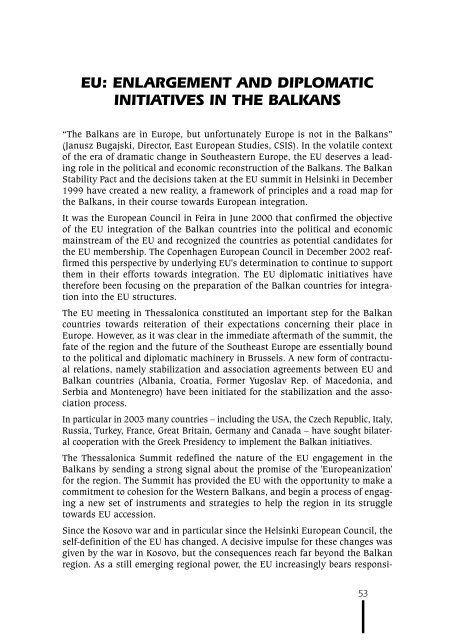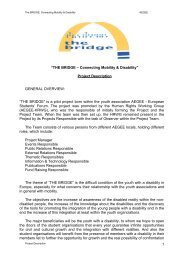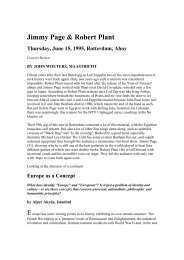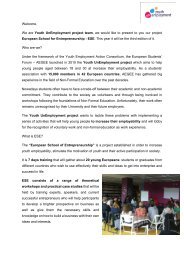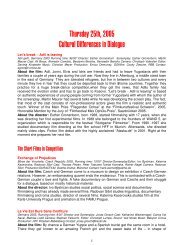europe's (torn?) identity - Projects - AEGEE Europe
europe's (torn?) identity - Projects - AEGEE Europe
europe's (torn?) identity - Projects - AEGEE Europe
You also want an ePaper? Increase the reach of your titles
YUMPU automatically turns print PDFs into web optimized ePapers that Google loves.
EU: ENLARGEMENT AND DIPLOMATIC<br />
INITIATIVES IN THE BALKANS<br />
“The Balkans are in <strong>Europe</strong>, but unfortunately <strong>Europe</strong> is not in the Balkans”<br />
(Janusz Bugajski, Director, East <strong>Europe</strong>an Studies, CSIS). In the volatile context<br />
of the era of dramatic change in Southeastern <strong>Europe</strong>, the EU deserves a leading<br />
role in the political and economic reconstruction of the Balkans. The Balkan<br />
Stability Pact and the decisions taken at the EU summit in Helsinki in December<br />
1999 have created a new reality, a framework of principles and a road map for<br />
the Balkans, in their course towards <strong>Europe</strong>an integration.<br />
It was the <strong>Europe</strong>an Council in Feira in June 2000 that confirmed the objective<br />
of the EU integration of the Balkan countries into the political and economic<br />
mainstream of the EU and recognized the countries as potential candidates for<br />
the EU membership. The Copenhagen <strong>Europe</strong>an Council in December 2002 reaffirmed<br />
this perspective by underlying EU's determination to continue to support<br />
them in their efforts towards integration. The EU diplomatic initiatives have<br />
therefore been focusing on the preparation of the Balkan countries for integration<br />
into the EU structures.<br />
The EU meeting in Thessalonica constituted an important step for the Balkan<br />
countries towards reiteration of their expectations concerning their place in<br />
<strong>Europe</strong>. However, as it was clear in the immediate aftermath of the summit, the<br />
fate of the region and the future of the Southeast <strong>Europe</strong> are essentially bound<br />
to the political and diplomatic machinery in Brussels. A new form of contractual<br />
relations, namely stabilization and association agreements between EU and<br />
Balkan countries (Albania, Croatia, Former Yugoslav Rep. of Macedonia, and<br />
Serbia and Montenegro) have been initiated for the stabilization and the association<br />
process.<br />
In particular in 2003 many countries – including the USA, the Czech Republic, Italy,<br />
Russia, Turkey, France, Great Britain, Germany and Canada – have sought bilateral<br />
cooperation with the Greek Presidency to implement the Balkan initiatives.<br />
The Thessalonica Summit redefined the nature of the EU engagement in the<br />
Balkans by sending a strong signal about the promise of the '<strong>Europe</strong>anization'<br />
for the region. The Summit has provided the EU with the opportunity to make a<br />
commitment to cohesion for the Western Balkans, and begin a process of engaging<br />
a new set of instruments and strategies to help the region in its struggle<br />
towards EU accession.<br />
Since the Kosovo war and in particular since the Helsinki <strong>Europe</strong>an Council, the<br />
self-definition of the EU has changed. A decisive impulse for these changes was<br />
given by the war in Kosovo, but the consequences reach far beyond the Balkan<br />
region. As a still emerging regional power, the EU increasingly bears responsi-<br />
53


